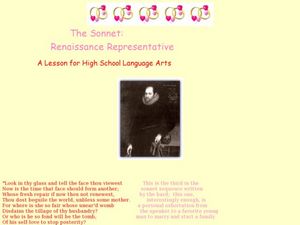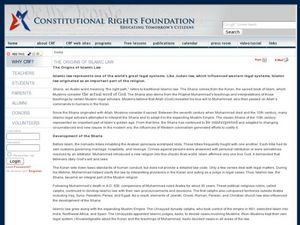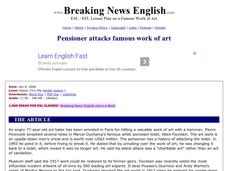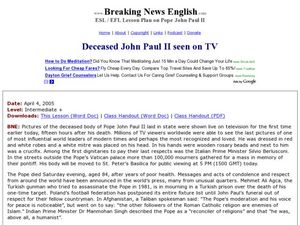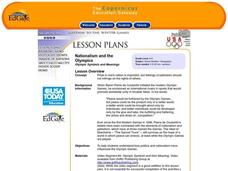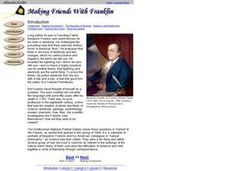Curated OER
A Rising People: Ben Franklin and the Americans
Students examine the Enlightenment Era and its philosophies, including philosophers. Students gain an understanding concerning what they new science was and what it led to through a series of lessons and a PowerPoint. the end by writing...
Curated OER
I'm a Celebrity, Get Me out of Here
Learners examine the presence of the paparazzi. In this media awareness lesson, students visit the noted Web sites to determine the influence and support that the paparazzi enjoys in modern society. Learners create guides to the paparazzi.
Curated OER
Scientific Revolution
In this scientific revolution study guide worksheet, learners respond to 14 short answer questions. The questions correlate to assigned readings in a textbook.
Curated OER
Henry Luce: Turn Me Luce
Students research the life of Henry Luce, Time Magazine's founder, and examine the impact his magazine has had on the way American's see the world. They create a photo-essay, magazine or video to present their research.
Curated OER
History by Heroes
Middle schoolers role play one of the Presidents between 1877 and today. Individually, they use the internet to research the President through official documents, political cartoons and various editorials. Throughout the year, they are...
Curated OER
Feel the Music
Students identify and demonstrate a positive learning attitude. They also demonstrate responsible emotional and cognitive behaviors and identify how to communicate clearly in oral, artistic, written, and nonverbal form. Finally, students...
Curated OER
The Sonnet: Renaissance Representative
Students compose couplets, quatrains, and sonnets after learning about Italian and English sonnets. In this sonnets lesson plan, students read sonnets, analyze them, connect them to the Renaissance and present times, and then write their...
Curated OER
Gesture and Chance
Students examine the role of chance in creating Dada art and analyze the idea of gesture. In this art analysis lesson, students consider gesture in drawings and the role of chance in Dada art. Students complete image based discussion....
Curated OER
John Fox Slater and the Freedmen
Eleventh graders discover how Northern philanthropists fought against Jim Crow laws in the South. In this Reconstruction lesson, 11th graders analyze 2 letters written by John Fox Slater and determine what his motivations were in...
Curated OER
The Origins of Islamic Law
Ninth graders examine Islamic Law. In this Law lesson, 9th graders read documents on the origins of Islamic Law. Students create answers to questions based on Islamic Law.
Curated OER
The Persian Empire
In this the Persian empire worksheet, students read a two page passage about Persia, then answer 5 multiple choice and 7 short answer questions requiring research about the topic.
Curated OER
Moses and the Ten Commandments
Students watch a video about Moses and the Ten Commandments; participate in discussion; create a replica table of the Ten Commandments, or create a picture illustrating the parting of the Red Sea.
Curated OER
Breaking News English: Pensioner Attacks Famous Work of Art
In this English activity, learners read "Pensioner Attacks Famous Work of Art," and then respond to 47 fill in the blank, 7 short answer, 20 matching, and 8 true or false questions about the selection.
Curated OER
Breaking News English: South Korea Loses National Treasure in Fire
For this English worksheet, students read "South Korea Loses National Treasure in Fire," and then respond to 1 essay, 47 fill in the blank, 7 short answer, 20 matching, and 8 true or false questions about the selection.
Curated OER
Breaking News English: Deceased John Paul II Seen on TV
In this English worksheet, students read "Deceased John Paul II Seen on TV," and then respond to 47 fill in the blank, 7 short answer, 20 matching, and 8 true or false questions about the selection.
Curated OER
What was Newton's Idea of Science?
Learners form logical foundations for analysis of observations. They improve analytic reading abilities through practice. Students investigate the foundations of scientific thought processes and how to apply them.
Curated OER
Nationalism and the Olympics
Middle schoolers discuss the topic of nationalism in the Olympics. After viewing video segments, they discuss how politics and nationalism have influenced the Olympic Games in various ways. They also examine the main reasons why a...
Curated OER
Making Friends With Franklin
Students will reflect upon the life of Benjamin Franklin in order to understand his place in history. Emphasis is placed upon the development and contributions he made to modern science inquiry. The learner uses readings to do various...
Curated OER
Who Invented It? When? Chinese Inventions: An Introductory Activity
Students use Robert Temple's "The Genius of Chins: 3,000 Years of Science, Discovery and Invention", to understand how much the Chinese have contributed with their scientific and technological ability.
Curated OER
Good Brother, Bad Brother
Learners are exposed to the writings of John Wilkes Booth. They discover that fanaticism is not just a modern phenomenon. They examine four periods in American history when treason was at issue.
Curated OER
A Changing Society
Seventh graders examine Chaucer's work about the medieval times. In groups, 7th graders imagine what modern activities could replace some tasks used in medieval times.
Curated OER
Dealing with Growth and Change
Pupils discuss the right and wrong actions of a young Navajo boy. Using that information, they compare and contrast his culture to their own. In groups, they create a newspaper or poster showing the cultural contributions of the people...
Curated OER
Visit The Orchard
Learners investigate the technology that is used to harvest apples as a crop. They look at examples of past and present machines. The information is used as inspiration for creating their own device to pick and harvest apples for mass...
Curated OER
Breaking News English: A New Prince for Denmark
In this English worksheet, learners read "A New Prince for Denmark," and then respond to 47 fill in the blank, 7 short answer, 20 matching, and 8 true or false questions about the selection.






